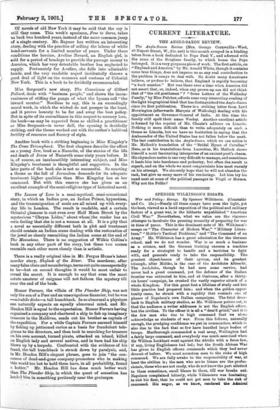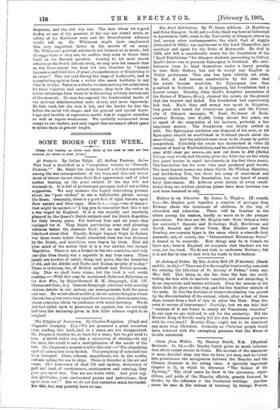SPENSER WILKINSON'S ESSAYS.
War and Policy : Essays. By Spenser Wilkinson. (Constable and Co. 15s.)—Nearly all these essays have seen the light, yet the best, viewed as a lucid exposition of the political and military factors of a great war, is the hitherto unpublished " American Civil War." Nevertheless, what we value are the vigorous attempts to inculcate the pressing necessity of preparing for war in time of peace. This is the dominant note of Mr. Wilkinson's essays on " The Character of Modern War," "Military Litera- ture," "Moltke's Tactical Problems," and "The Command of an Army." Mr. Wilkinson has a great admiration for the German school, and we do not wonder. War is as much a business as a science, and the German training ensures a machine ready for a strategist to handle and a tactician to fight with, and generals ready to take the responsibility. The greatest object-lesson of their system, and its greatest triumph, after Moltke, is the case of the Archduke Albrecht. The Archduke, though he had seen some service, had never had a great command, yet the defence of the Italian frontier was entrusted to him, and at Custozza, after a thirty- six hours' campaign, he crushed the vastly superior attack of a whole Kingdom. For this great feat a lifetime of study and but little practice had prepared him ; and when the golden oppor- tunity came, he struck with a rapidity that reminds one of phases of Napoleon's own Italian campaigns. The fatal draw- back to English military studies, as Mr. Wilkinson points out, is that the audience a writer addresses is not the English officer, but the civilian. To the officer it is all a " dem'd grind," and it is the few men who rise to high command that we alone acknowledge as students of war. From this follows, naturally enough, the grudging confidence we put in commanders, which is also due to the fact that so few have handled large bodies of troops. Marlborough commanded a real army, Wellington had a fairly large command, and everybody was much exercised when Sir William Lockhart went against the Afridis with a force few, if any, living Englishmen had led ; but the South African War has given to English officers commands which they had never dreamt of before. We must accustom men to the risks of high command. We are fully awake to the responsibility of war, at least the civilian is; the men who are to blame are the profes- sionals, those who are not ready, who do not know the part allotted to them sometimes, small blame to them, till war breaks out. Napoleon complained bitterly, while Villeneuve was hesitating to risk his fleet, that he could not get men to take the risk of command. Hie anger, as we know, rendered the Admiral
desperate, and the risk was run. The man whom we regard to-day as one of the generals of the age has risked much, as critics of his Kandahar rush and his Bloemfontein advance would tell us. Kr. Wilkinson might have emphasised this very important factor in the morale of an army. Mr. Wilkinson's political articles do not interest us so much ; full of suggestions as they are, we confess they seem to throw little liebt on the Eastern question. Coming to his most recent articles on the South African crisis, we may note his remark that as the Gove'nment has been led into blunders by "honest ignorance and fond love of peace, its carelessness or blundering is no crime." This was said during the siege of Ladysmith, and is a comforting opinion from a writer who never hesitates to say what he thinks. Taken as a whole, we have nothing but admiration for these vigorous and earnest essays; they show the writer to better advantage than when he is discussing military movements of the moment. No man has exposed the fundamental faults of our military administration more cli arly and more vigorously. He hits hard, but the iron is hot, and the harder he hits the better the metal will shape; and his general and special know- ledge and lucidity of expression enable him to suggest remedies as well as expose weaknesses. We cordially recommend these essays to our readers, and only regret that we cannot afford space to notice them at greater length.



































 Previous page
Previous page